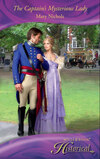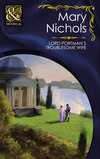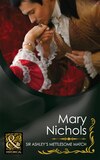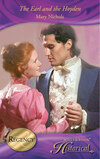Kitabı oku: «The Captain's Mysterious Lady», sayfa 2
It was dark by the time he reached the village. A dog barked loudly from a farmhouse on his right; another answered from the churchyard on his left. He clopped on. A few cottages straggled along the road until he came to the crossroads and here there was light spilling from the open door of an inn. He reined in, slipped the strap from around his neck and called for the landlord to come to his assistance; he could not dismount until someone took his burden from him.
A man came out carrying a lantern. ‘Make haste, man,’ he told him. ‘The lady has been injured. She must be put to bed. Is there a doctor hereabouts?’
‘Not before Downham, sir. My wife will see to her.’
James gently lowered the girl so that the innkeeper could take her, then he dismounted and took her back to carry her inside.
The innkeeper’s wife hurried forwards. ‘What has happened?’
‘The coach overturned four miles back,’ James told her. ‘There’s a dead man and a dead horse. The coachman, the guard and my servant are following on foot. They will all need bruises and cuts seeing to and sustenance when they arrive, but first a room and a bed for the young lady.’
‘This way, sir.’ She led the way up a flight of stairs where she pushed open the door of a bedchamber. ‘Will this suffice?’
He looked about him. Although it was small, the room and the bed hangings were clean. ‘Yes, thank you.’
‘Do you need anything else? Hot water? Food and drink?’
‘All of those things when the lady regains her senses. Unfortunately she has been unconscious for some time and I do not even know her name.’ He put his burden on the bed.
‘My goodness, I know her,’ the lady said, peering down at the unconscious woman. ‘She used to live at Blackfen Manor, hard by here, when she was a child. I disremember her name—it was some time ago, you understand—but I know the ladies at the Manor, Miss Hardwick and Miss Matilda Hardwick.’
‘Then send for them at once. They will know what to do.’
The girl on the bed stirred and moaned and opened her eyes. ‘Where am I?’
‘At the King’s Arms in Highbeck,’ James answered. ‘You had a nasty knock on the head when the coach overturned.’
‘Coach?’
‘Yes, you were travelling on it. Don’t you remember?’
‘No. Where was I going?’
‘Coming here, I think.’
‘Why?’
‘You have kin at Blackfen Manor,’ the innkeeper’s wife put in. ‘I expect you were coming on a visit.’
‘I don’t remember.’
‘It is hardly surprising,’ James said. ‘You were knocked out.’
‘Who are you?’ she asked him.
‘Captain Drymore, at your service,’ he said. ‘I was travelling on the same coach. Now you must rest. We are going to send word to Blackfen Manor for someone to take charge of you. I will leave you in the care of our hostess and come to see you again later.’
The innkeeper’s wife accompanied him to the door. ‘Was she travelling alone?’ she asked.
‘She had an escort, but he’s dead,’ he whispered. ‘I don’t know whether to tell her that or not.’
‘We should tell the ladies when they come.’
He left her to tend to the girl’s bruises and went downstairs again to find the others had arrived and were making themselves comfortable in the parlour with a quart of ale each, while food was prepared for them. ‘What now?’ Sam asked when he joined them.
‘She is known to the innkeeper’s wife. It appears she has kin close by and someone is going to fetch them to take charge of her,’ James told him.
‘Thank the Lord for that, for a moment I thought we were going to be saddled with her.’
James realised, with a jolt, that her predicament had driven the main purpose of his journey from his mind, but it was time he began to think of it. ‘And you wouldn’t want that, would you, my friend?’
‘To be sure, it would put a spoke in the wheels. Has she got her senses back?’ Sam asked.
‘Yes and no. She is conscious, but still too dazed to know what has happened to her. No doubt the sight of her relatives will be all that’s needed.’
‘Then we go on?’
‘To Peterborough?’ James queried vaguely, his mind still half with the mystery of the girl.
‘Yes, had you forgot where we were going and why?’
‘No, I had not and I’ll thank you to mind your manners.’
‘I beg your pardon, Cap’n sir, but you must admit you can’t be worrying about that one upstairs when we are so close to success.’ Sam was almost as determined on catching those two as he was, knowing what it meant to him.
‘How do you know we are close to success?’
‘We know they were on that coach and going to Peterborough, don’t we?’
‘Just because they paid the fare to Peterborough, does not mean they meant to travel all the way there. They could have left the stage anywhere to put us off the scent again. Or they may have gone on somewhere else,’ James pointed out.
‘And they might have been held up by those two highpads. That would have delayed them, don’t you think?’
‘Very true, but in the absence of evidence to the contrary we will head for Peterborough.’
‘I took the liberty of making enquiries, Captain, and there’s a coach coming through at first light which will take us on to Downham Market. And there are connections to Peterborough.’
‘Good. We can’t do anything more here.’
After they had eaten, James went up to speak to the young lady and take his leave of her. She had swallowed a little supper, he was told, but she was still dazed. ‘She’ll be fine as ninepence when the Misses Hardwick come to take care of her,’ the innkeeper’s wife said, as they stood outside the bedchamber talking quietly.
‘You have sent word to them?’
‘Yes, but they are maiden ladies and will not venture out at this time of night. They will be here in the morning.’
‘Are you sure of that?’ He was torn between staying and leaving. It was curiosity mixed with pity and a feeling of responsibility that made him want to stay and see her safely with her kin, while the determination to find his wife’s killers and see them hanged drove him relentlessly.
‘Oh, yes, indeed. Lovely ladies they are, always pleasant, always have a kind word for everyone and they do a deal of good in the village. I reckon she must be a niece or something of the sort. It’s a mystery, though.’
‘What is?’
‘No baggage, no money, nothing, according to the coachman.’
‘I will recompense you for her food and lodging.’
‘I did not mean that, sir, indeed I did not. I am sure the Misses Hardwick will see to that. I was thinkin’ what a mystery it was.’
‘Yes, to be sure. But no doubt when the lady recovers her senses she will be able to enlighten you. In the meantime, can I leave her with you?’
‘Yes, of course. You must be anxious to continue your journey.’
‘I am.’ His mind was made up. ‘Pressing business, you understand. We shall go on the early coach, but a bed for the rest of the night will be welcome.’
‘Certainly, sir. I’ll see to it.’
He took several coins from his purse and handed them to her, enough to cover his and Sam’s stay and the young woman’s. ‘I will go in and say my farewells. I doubt I shall see her in the morning.’
He opened the door and stepped into the room. The invalid lay in the bed, staring at the ceiling, lost in thought.
‘Madam,’ he said, moving over to stand beside her. She looked small and frail in the big bed.
She turned towards him. ‘Captain Drymore. That is right, is it not? I have remembered your name correctly?’
‘Yes, that is my name. Can you tell me yours?’
A tear found its way down her cheek. ‘I must have had a really bad bang on the head, for I cannot remember it. I have been lying here, racking my brain, and it just will not come.’
He sat down on the edge of the bed. ‘Do not distress yourself. When you are with your relations again and in familiar surroundings, everything will come back to you.’
‘I expect you are right. But I must thank you for what you have done for me. The landlady has told me and it seems I am in your debt.’
‘Not at all. I did nothing.’ He stood up. ‘I came to say goodbye and to wish you well. I am leaving very early in the morning to continue my journey. Mrs Sadler has assured me I can safely leave you in her care until your relatives come for you.’
‘Then goodbye, sir. And again my gratitude.’
He gave her a small bow and left the room. He did not like leaving her, but Sam was right, he could do nothing more for her. They were strangers who had passed a few hours in each other’s company, that was all. But she was a courageous little thing and he hoped she would make a full recovery. One day, perhaps, after he had seen justice done for Carrie, he might call at Blackfen Manor and enquire after her.
Chapter Two
Amy was walking across the fields surrounding Blackfen Manor, stopping every now and again to watch a butterfly flitting from flower to flower, or a skylark soaring, or gazing into the water of the river at her own reflection. It was like looking at a stranger. The image gazing back at her was unknown to her. She saw a woman in a plain unpadded gown, with fair hair tied back with a ribbon, a pale face and worried-looking eyes. It was the same when she looked in the mirror in her bedchamber, a stranger’s blue eyes looked back at her. ‘Who are you?’ she would whisper. Teasing her woolly brain about it only brought on a headache.
‘Do not fret, it will come to you, my dear,’ Aunt Matilda had said. She was the rounder and softer of the two ladies who had come to the King’s Arms to fetch her after the accident. The other, Aunt Harriet, was taller and thinner, more practical and down to earth. Both wore gowns with false hips, though nothing like as wide as those worn in London, and white powdered wigs. They were, so they told her, her mother’s sisters and their surname was Hardwick, none of which she could remember. She didn’t remember her own name, let alone that of anyone else.
‘You are Amy,’ Aunt Harriet had told her, when Matilda could not speak for tears. ‘And once we have you home, you will soon recover your memory. It is the shock of the accident that has taken it from you. You will be chirpy as a cricket tomorrow and then you can tell us what happened.’
‘I am glad I have found someone who knows who I am,’ she had told them. Lying in bed in the inn with no recollection of who she was, or how she had got there, had been frightening.
‘Of course we know who you are. Did we not bring you up from a child? You were coming to visit us, no doubt of it, though why you did not send in advance to say you were coming, we cannot think.’
They had brought her to Blackfen Manor in their gig, put her to bed and sent for their physician. He had said she had no broken bones and her many bruises would fade in time. And he confidently predicted her memory would return once she was up and about surrounded by familiar things and people she loved and trusted. She had to believe him or she would have sunk into the depths of despair.
But after two months, she could remember nothing of her life before that coach overturned, and very little of the immediate aftermath of that. Her aunts were kind to her, fed her with beef broth, roast chicken, sweetbreads and fruit tarts, saying she was far too thin, and provided her with clothes, having assumed her baggage had been stolen from the overturned coach. They fetched things to show her in an effort to jog her memory, saying, ‘Amy, do you remember this?’ Or ‘Look at this picture of us and your mama our papa had painted just before she married Sir John Charron.’
‘Amy Charron,’ she murmured.
‘No, not Amy Charron, not any more,’ Matilda had told her. ‘You are wed to Duncan Macdonald, have been these last five years.’
‘Married?’ This had surprised her, though why it should she did not know.
‘Yes.’
‘Where is he? Why was he not with me?’
‘We have no idea, though if he knew you were coming to visit us, he would not worry, would he? When he learns what has befallen you, he will come post haste.’
‘Did I deal well with him? Were we happy together?’
‘Only you can know that,’ Harriet said. ‘You never complained of his treatment of you, so one must suppose you were.’
‘Do we have children?’
‘No, not yet. But there is time, you are still very young.’
‘How old am I?’
‘Five and twenty.’
Twenty-five years gone and all of them a mystery!
She had written to Duncan to tell him what had happened, which had been difficult since she knew nothing about him except what her aunts were able to tell her, did not even know the address to write to until they told her. He was an artist, they had said, though how successful he was they did not know. He was of middling height and build, was careful of his appearance and always wore a bag wig tied with a large black bow, which did not tell her much. In any case, she had had no reply.
It was all very frustrating. She could not remember her husband. What did he look like? Did she love him? She supposed she must have done or she would not have married him, but if he turned up would she know him? How could you love someone you could not remember? Why had she left him behind when she made the journey? Why had he allowed her to travel alone? But she hadn’t been alone, had she? By all accounts there had been a man with her and he had died of a broken neck. Who was he? She wasn’t running away with him, was she? Oh, that would be a despicable thing to do! But how could she know whether she was a wicked person or a good one? When she asked the aunts, they were adamant that she had the sweetest temperament and would not hurt a fly. ‘Goodness, have we not brought you up to be a good, law-abiding Christian?’ they demanded. ‘If anyone is wicked, it is certainly not you.’
‘Why did you bring me up?’
‘Because your mama is an opera singer and is always travelling about from one theatre to another and that was not a good life for a young child, so we offered to rear you,’ Aunt Matilda said. ‘We wrote immediately to tell her you are here safe and sound. I am sure she would have come to see you if she were not in the middle of a season of opera at Drury Lane.’
‘And my father?’
‘He lives abroad.’
‘Why?’
They had shrugged. ‘Heaven knows.’ But she thought they did know.
‘Did I love him?’
‘Of course you did,’ Harriet said. ‘You were especially close and very downpin when he went away.’ They had showed her a portrait of him, a cheerfullooking man with grey-green eyes and a pointed beard, but it did nothing to help her recall the man himself.
She stopped walking to turn back and look at the Manor. It was a solid Tudor residence, with a moat about it and a drawbridge with twin turrets on either side of the gate, which led to an enclosed courtyard. She found it difficult to believe she had spent most of her childhood there. In the last two months she had explored every inch of its many nooks and crannies, but nothing reminded her of anything. It was like being born, she supposed, with no history behind you and everything new.
She had strolled about the gardens both within and outside the moat and climbed the tower on the edge of the estate that had been built as a look-out and from which she could see the countryside for miles around: the river, the road, the village with its church and inn, all things she had known and loved in her childhood, according to her aunts. The people she met in the village would speak to her, ask how she did, address her sometimes as Mrs Macdonald, but more frequently as Miss Amy, and she would reply, hiding the fact she could not remember their names.
She could not even remember Susan, much to that good woman’s sorrow. Susan was in her middle thirties and had been with the family since she was twelve, moving up the hierarchy of the servants from kitchenmaid to chambermaid and from there to lady’s maid. But she was more than that, she was a valued companion to both old ladies and had known Amy since childhood, had watched her grow up and helped her dress, scolded her when she was naughty and praised her when she was good. Susan had added her efforts to get her to remember, all to no avail.
Her aunts were worried, she knew that. They had tried everything they could think of to jog her into remembering, but nothing seemed to work. ‘I fear something dreadful occurred before the accident that occasioned your loss of memory,’ Matilda had said only the day before.
‘Something so dreadful I have blotted it from my mind, you mean?’
‘Perhaps. If only Duncan would come, I am sure the sight of him would effect a cure.’
‘Then why has he not answered my letter?’
‘We cannot tell,’ Harriet put in. ‘Unless something has happened to him, too. I have written to ask your mother to make enquiries.’ Her mother, so she was told, had an apartment near the theatre, not far from Henrietta Street where Amy and her husband had their home. That was another thing Amy could not remember. Racking her brains produced nothing. By day she was calm, though worried, but her nights were beset by violent dreams in which she was running, running for all she was worth, knowing there was something evil behind her.
Only the week before, her mother had written to say she had not seen Duncan and their house was unoccupied. Lord Trentham had come to see the opera and had taken her out to supper afterwards and she had asked him to help uncover the mystery. Lord Trentham, Aunt Harriet had explained to Amy, was a lifelong friend of the family and a man of influence. Whether he would succeed Amy was not at all sure, but he seemed her only hope.
Sighing, she began to walk slowly back to the house, trying, as she did every day, to remember something, anything at all, that would shed some light on the life she had led before the coach overturned. She knew she had been rescued by a gentleman who had apparently been another passenger, but she had been so dazed by her experience she could not remember his name or what he looked like. And he had not stayed to see her handed over to her aunts, so they had no idea who he was. Had he known her before that journey? Was he part of the mystery?
James was on his way to Bow Street to pay Henry Fielding a visit. He had not caught his wife’s murderers thanks to that coach overturning and the delay in arriving at Peterborough, where the trail had gone cold. He had returned to London, along with thousands of others who had decided the threat of more earthquakes had been exaggerated and the world was not about to come to a violent end. Rather than go to his Newmarket estate, he decided to stay with his parents at Colbridge House, expecting Smith and Randle to return to the metropolis as soon as they thought the coast was clear but, in two months, none of his contacts had seen or heard anything of them. London’s Chief Magistrate had been a great help to him over his quest in the past and he might have heard something of them.
The street was crowded with people going about their business, jostling each other in their hurry to reach their destinations: city men, gentlefolk, parsons, hawkers, women selling posies, piemen, street urchins. James hardly spared them a glance as he made his way on foot to the magistrate’s office, where he found him in conversation with Lord Trentham, a one-time admiral, whom he had known from his years of naval service.
‘Now, here’s your man,’ the magistrate said to his lordship, after greetings had been exchanged and a glass of brandy offered and accepted. ‘He can help solve your mystery.’
‘Oh, and what might that be?’ James asked guardedly, assuming they wanted to inveigle him into more thieftaking.
‘A man has gone missing and his lordship wants him found.’
‘Men are always going missing,’ he said. ‘I know of two myself I should dearly like to find.’
‘Still no luck?’ Henry queried.
‘Afraid not. I have been chasing them all over the country. What we need is a paid police force, one that investigates crime as well as arresting criminals, a body of men in uniform that everyone can recognise as upholders of law and order.’
‘I agree with you,’ the magistrate put in. ‘I am working on the idea and one day it will come about, but in the meantime I must put my faith in people like you.’
‘That has come about because of my determination to see Smith and Randle hang.’
‘Bring them before me, and they will,’ the magistrate told him. ‘In the meantime, will you oblige Lord Trentham?’
‘I assume the missing man is a criminal of one sort or another?’ James enquired.
‘We do not know that,’ his lordship put in. ‘Might be, might not. His wife’s family want him found.’
James laughed. ‘An absconding husband!’
‘We do not know that either.’
‘It is a mystery,’ Henry Fielding said. ‘And you are a master at solving riddles and can be trusted to be discreet.’
‘That is most kind of you,’ he said, bowing in response to the compliment. ‘But I am not at all sure I want to solve this particular riddle. Coming between husband and wife is not something I care to do.’
‘Let me tell you the story and then you can decide.’ Lord Trentham said.
‘Go on.’ He was availing himself of the magistrate’s best cognac and politeness decreed he should at least hear his lordship out.
‘The wife in question is the daughter of a very dear friend, Lady Sophie Charron—’
‘The opera singer?’
‘The same. Two months ago she was on a coach travelling to her relatives in Highbeck, in Norfolk, when the coach was held up by highpads, only for it to be overturned half an hour later. She has recovered from her injuries, but cannot remember anything leading up to the accident. Her memory is completely blank. And her husband has disappeared. The house where they lived is a shambles. We are of the opinion something happened.’
James had begun to listen more intently as the tale went on, realising they were talking about his mystery lady. He had often wondered what had become of her, had not been able to get her out of his mind, even after he had been to Peterborough and back. Her pale, frightened face haunted him. How could he be sure he had left her in good hands? Was this another occasion for guilt that he had done nothing to help her? Was his pursuit of Smith and Randle robbing him of his common humanity? He had toyed with the idea of calling to see how she fared, but Highbeck was remote and not connected with his own search and he could not be sure she was still there so he had put off doing so.
‘I met the lady,’ he said quietly. ‘I was travelling on the same coach.’
‘You were?’ Lord Trentham leaned forwards, his voice eager. ‘Then you know more than we do.’
‘Not about her husband I do not. I did not know she was married.’ He went on to tell them exactly what had happened and his impressions of the demeanour of the young lady. ‘She was at the inn being looked after by the innkeeper’s wife when I left. I was assured her relatives had been sent for and would take care of her, but I have often wondered if I was right to leave her.’
‘Oh, yes, her aunts, Lady Charron’s sisters, fetched her and she is staying with them at Blackfen Manor,’ his lordship explained. ‘But her husband has disappeared. They think if he could be found, her memory might be restored to her.’
‘What do you know of him?’ James asked.
‘His name is Duncan Macdonald.’
‘A Scotsman?’
‘I believe so, though he has lived many years in England. He is an artist, though not a very successful one. He also plays very deep and I believe the couple were in financial trouble. It might be why he has disappeared.’
‘A cowardly thing to do, to leave his wife to set off alone for her relatives, don’t you think?’ James remarked.
‘Yes, if that is what he did, but perhaps he had disappeared before she left. She might have been going to look for him,’ his lordship suggested.
‘She chose a singularly unattractive helpmate if that was the case. A surly individual in a rough coat and a scratch wig. She seemed terrified of him. Also, he was known to the robbers who held up our coach. And I believe she recognised them as well, although I may be mistaken in that,’ James said.
‘Oh dear, it is worse than I thought,’ said Lord Trentham. ‘Did you by chance learn the man’s name?’
‘Gus Billings, I think one of the highpads called him, but he died in the accident. Could he have been her husband under an assumed name?’
‘Unlikely. I only met Duncan Macdonald once when we attended the same opera and he and Amy came back stage to speak to Lady Charron, but he wore a bag wig and was dressed in a very fine coat of burgundy satin. He was charming enough, had exquisite manners, but there was something about him that made me wary. Amy was, is, a dear girl, certainly not a lady to consort with criminals.’
‘As you say, a mystery,’ James said, turning over in his mind what he had learned, which was little enough. At least he now knew the young lady’s name was Amy. He thought it suited her.
‘You will undertake to investigate, my dear fellow, won’t you?’ his lordship pleaded. ‘Her mother and her aunts are all anxious about her and I promised I would do what I could to help.’
‘Memory is a strange thing,’ he said. ‘Sometimes it shuts down simply to avoid a situation too painful to bear. One must be careful not to force it back. Mrs Macdonald might be happier not remembering.’
‘True, true,’ Lord Trentham said. ‘But if we could discover what is at the back of it without distressing her, then we might know how to proceed.’
James was torn between taking on the commission and continuing the search for his wife’s killers, but that had lasted so long and yielded so little reward he did not think it would make any difference if he set it aside for a week or two. He would do what he could to help, if only to make amends for not doing anything before. ‘If you would be so good as to furnish me with a letter of introduction to the lady’s aunts, I will go to Highbeck and see what I can discover,’ he said. It ought not to take him long and after that he must resume his search for Smith and Randle. He would not rest until they were caught.
Lord Trentham wrote the letter; once this was done and handed to him, James returned to Colbridge House to instruct Sam to pack for a stay in the country, realising, as he did so, that once again he had unwittingly found himself embroiled in uncovering crime.
Amy was just leaving the mill next to the King’s Arms, where she had gone to buy flour to make bread, when two horsemen rode into the yard of the inn and dismounted. The taller of the two hesitated when he saw her and looked for a moment as if he were going to speak. He was broad as well as tall, handsome in a rugged kind of way, with intense green eyes that seemed to take everything in at a glance, including her scattered thoughts. His tricorne hat covered sun-bleached hair, which was tied back with a narrow black ribbon. As with any gentleman who came to the village from outside it, she wondered if he might be Duncan, but when he sketched her a little bow and proceeded into the inn without speaking, she knew it was not the husband she looked for, for surely he would have spoken to her, taken her into his arms, called her by name?
The man had looked slightly familiar, as if she ought to know him, or at least was acquainted with him. Did that little bow confirm it? Or was it simply a courtesy? If only she could remember! She went on her way to make her purchase, intending afterwards to visit Widow Twitch, an old lady who lived in a cottage down a lane on the other side of the village who, according to her Aunt Matilda, had known her since she was in leading strings and was also recognised as a wise woman who had the gift of telling the future. Her advice might be worth listening to.
James had recognised Amy immediately and had been on the point of greeting her, but decided against it. He had wondered if she might remember him, considering he had held her in his arms on the ride from the scene of the accident to the inn. The memory of that had certainly stayed with him. He had spoken to her later and she had remembered his name then, but today, though she had looked at him, there had been no recognition in her blue eyes. Until he had spoken to the Misses Hardwick and ascertained exactly what they wanted of him, he would remain incognito.
He was glad to see that she looked well. Her cheeks were rosy and her hair, which had been so unkempt and tangled, was now brushed and curled into ringlets, over which was tied a simple cottager hat. She wore a striped cotton gown, a plain stomacher and a gauze scarf tucked into the front of it, an ensemble that would be decried in town, but was perfectly suitable for the country. She had filled out a little too, so that she bore little resemblance to the waif he had held in his arms. It was difficult to believe that her mind retained nothing of her past. Would reawakening her memory, even supposing it could be done, fling her back into that world of fear? She had been afraid, of that he was certain.
He did not need to eat, having dined at the Lamb in Ely not two hours before, so he left his baggage at the inn where he had booked rooms for himself and Sam, and hired a horse to take him to Blackfen Manor, leaving his own mount to be groomed and rested. He wondered if he might overtake the young lady, but there was no sign of her as he trotted along a well-worn path bordering fields of as yet unripe barley.
He passed the tower at the gates to the grounds and proceeded up a gravel drive until the Manor came into view. He did not know what he had expected, but the solid red-brick Tudor mansion with its mullioned windows and twisted chimneys was a surprise. He half-expected the drawbridge to be raised to repel raiders, but laughed at his fancies when he saw the bridge down and the great oak doors wide open. He trotted under the arch into a cobbled yard and dismounted at a door on the far side.













